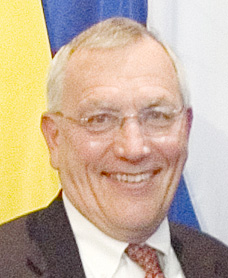Rome '08 Workshop
The Challenges of Using our Defense Industrial Base Effectively
Mr. Alfred Volkman
U.S. Director of International Cooperation
OPENING REMARKS
I would like to welcome you to the panel on the relationship between governments and defense industries in a global industrial base. To set the scene, Roger Weissinger-Baylon has made this a workshop on global security for many years. Of course, the one thought that always comes to my mind when I participate in these workshops is that they might better be called workshops on global insecurity, because, after you listen to a day and a half or two days of presentations, you might have a gloomy view of our future in the world, and probably with some reason. Fortunately, pleasant people always attend the workshops, we always have wonderful cultural experiences, and we always have warm experiences. So we do not need to be quite so gloomy.
However, there are a lot of reasons for having a sense of insecurity. In addition to what we think of as traditional global threats posed by nation-states, we also have to be concerned these days about the threats from terrorists, energy costs and shortages, climate change, unchecked immigration, and economic uncertainty. And those are just a few of the things that have been mentioned during the conference.
THE CHALLENGES OF EFFECTIVELY USING OUR DEFENSE INDUSTRIAL BASE CAPABILITIES
This distinguished panel is going to discuss what may be a more pleasant topic—the global defense industrial base, which I believe is strong, innovative, and capable of providing us with the equipment and technology that will permit us to defeat our adversaries, whoever they may be. The challenge, however, is how to effectively use this existing, enormous industrial and technological capability. I think it will become evident during the discussion that we can do a lot better job of using our industrial resources. But there are many issues that governments and industry must address if we are to effectively equip our warfighters and, as General Joulwan would be the first to say, that is what this is all about. It is about our warfighters, and making sure that they can do their job.
As several speakers have mentioned, we have scarce resources. There is never enough money, and we now seem to be entering a time of economic hardship and economic decline. For example, recently the Wall Street Journal said that the public debt in Italy exceeds 100% of the annual gross national product, and that is not picking on Italy; in the United States we are also experiencing some economic difficulties. So it is reasonable to expect that the resources that are available for defense will be challenged. What do we do about that? Politicians want jobs for their constituents, military men want military capability, politicians and government administrators also want to keep constraining the costs that are associated with equipping our forces and with defending our national security. In NATO, for instance, we have been trying for over 10 years to get a ground surveillance capability. I would contend that this is because we cannot strike the right balance among industrial participation by nations, military capability, and the cost that is required to provide this kind of capability—a problem we need to address.
Most nations are now actively engaged in a war against terrorists, but many nations believe that they also must be prepared to fight conventional wars against nation-states. How do we balance the resources that we have to wage the battle against terrorism, the long war that we will be fighting against terrorist threats, with the legitimate need to think about how we must defend ourselves in a more conventional war against traditional nation-states? You could argue that this has been on the front page of papers in the United States lately because, frankly, it cost my friend and former boss Secretary of the Air Force Mike Wynne his job because of a disagreement he and Mr. Gates had over the exact direction we should go in this regard. As a matter of fact, Mr. Wynne told me once that he had a personality conflict with his boss, and he said that when that is the case, your boss has the personality and you have the conflict! (That is my one joke!)
Another question we must ask is, What industrial capability must governments maintain within their borders and for what else can they rely on the global industrial base? I know that the United Kingdom has been struggling for several years with defense industrial policy, though my U.K. colleagues may disagree with the word “struggling.” But it is a difficult area that requires a lot of thought, and, no matter what you decide, someone is going to be unhappy about your decision. We have here a distinguished panel of industrialists and government officials to discuss some of the issues I have just raised.

